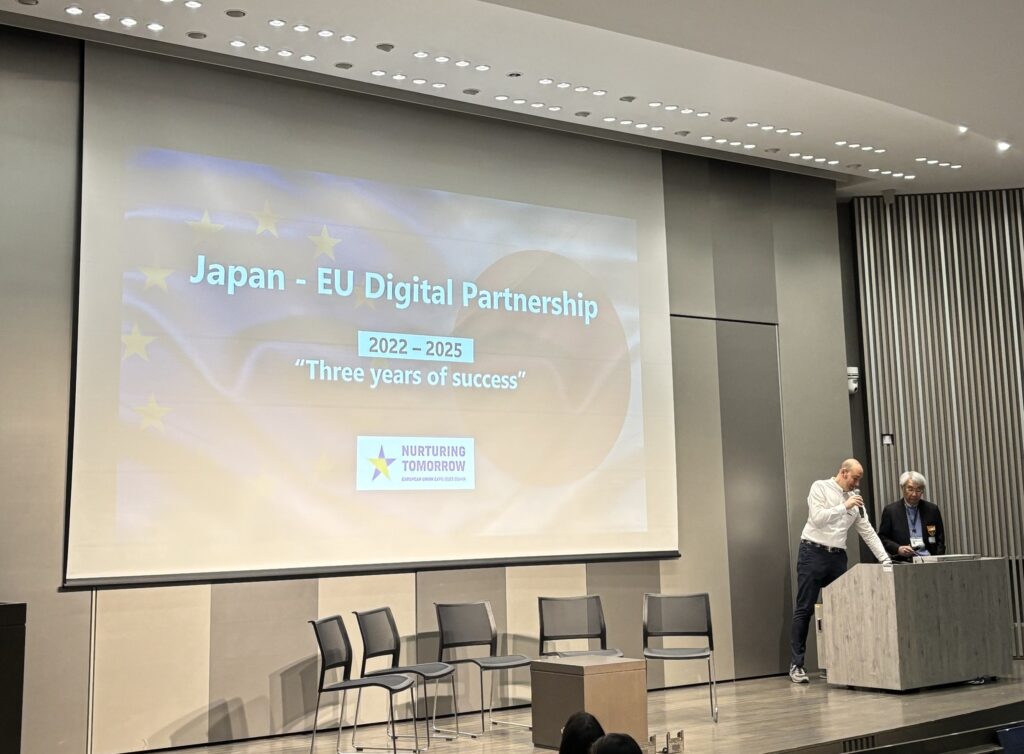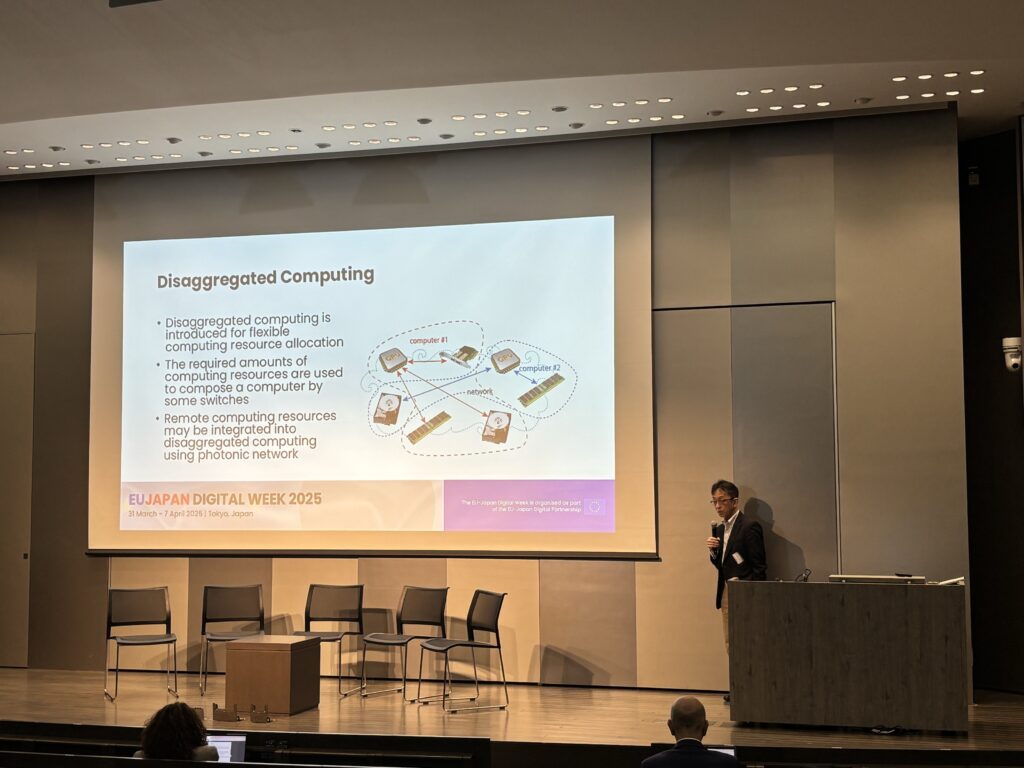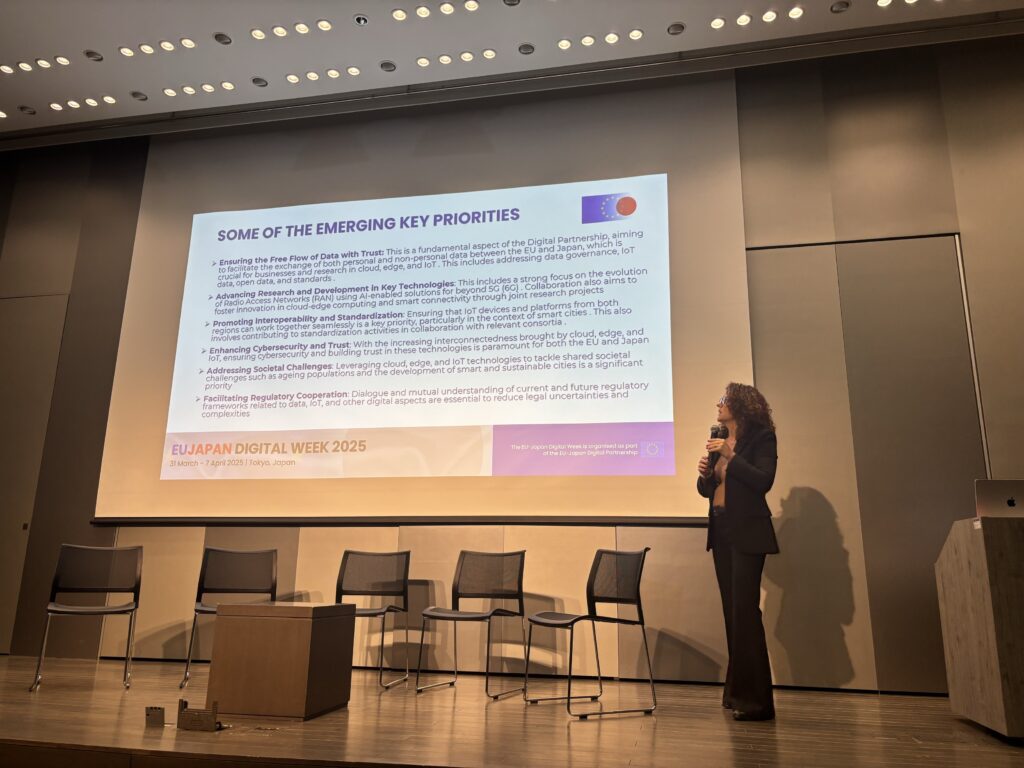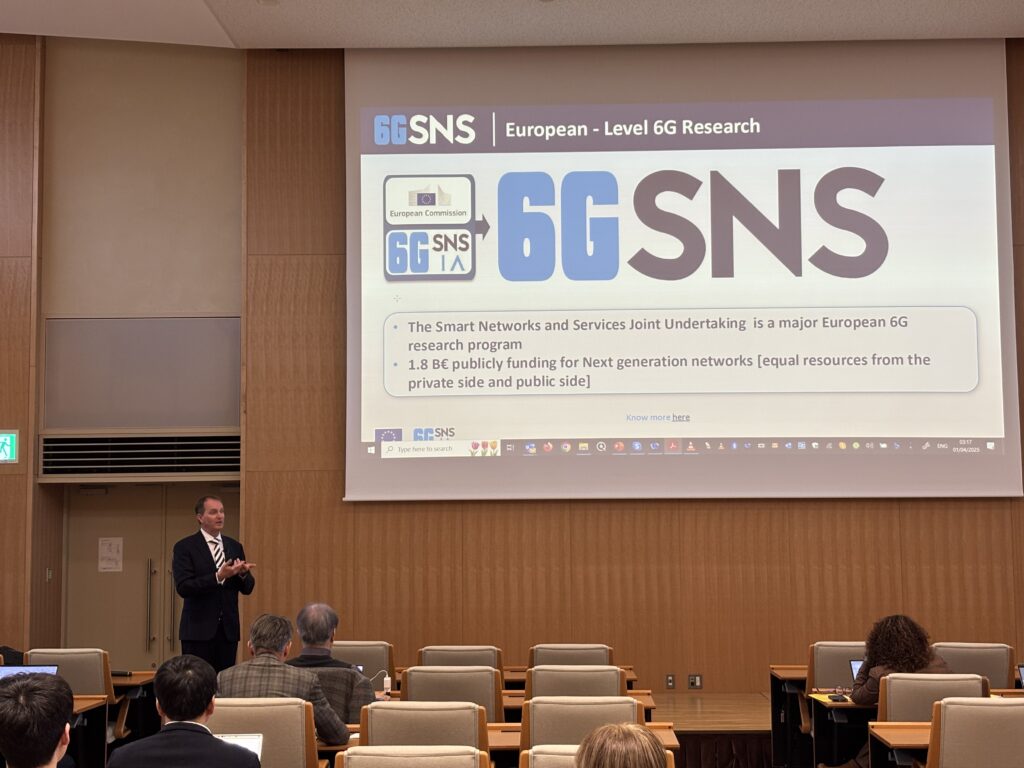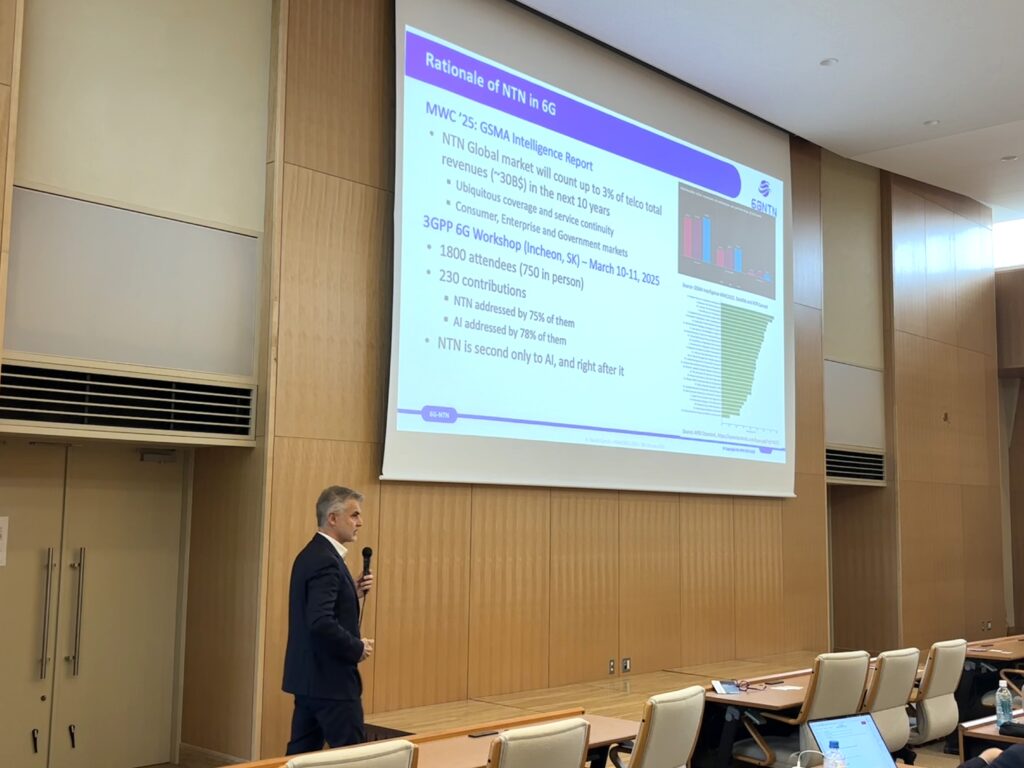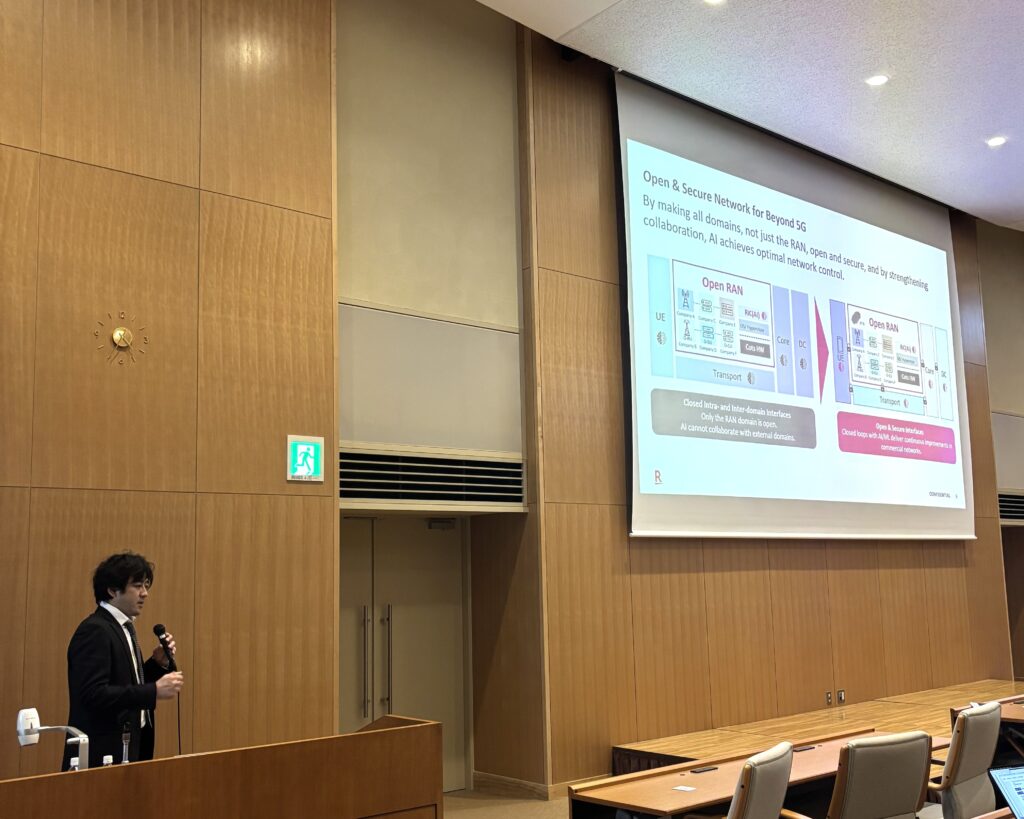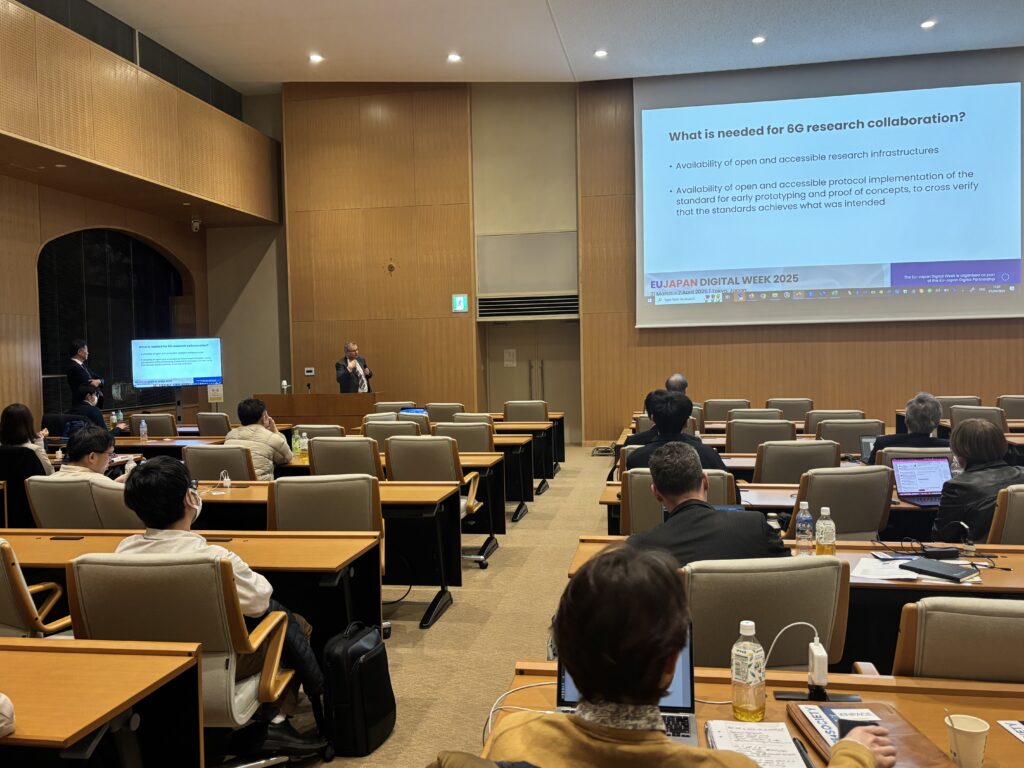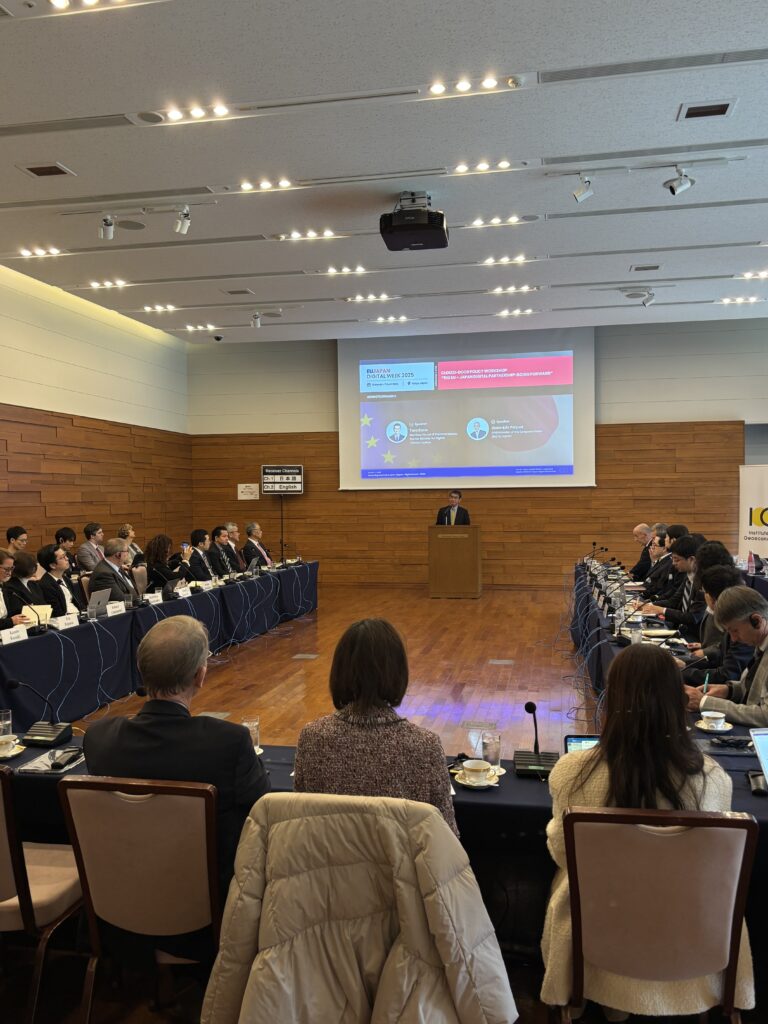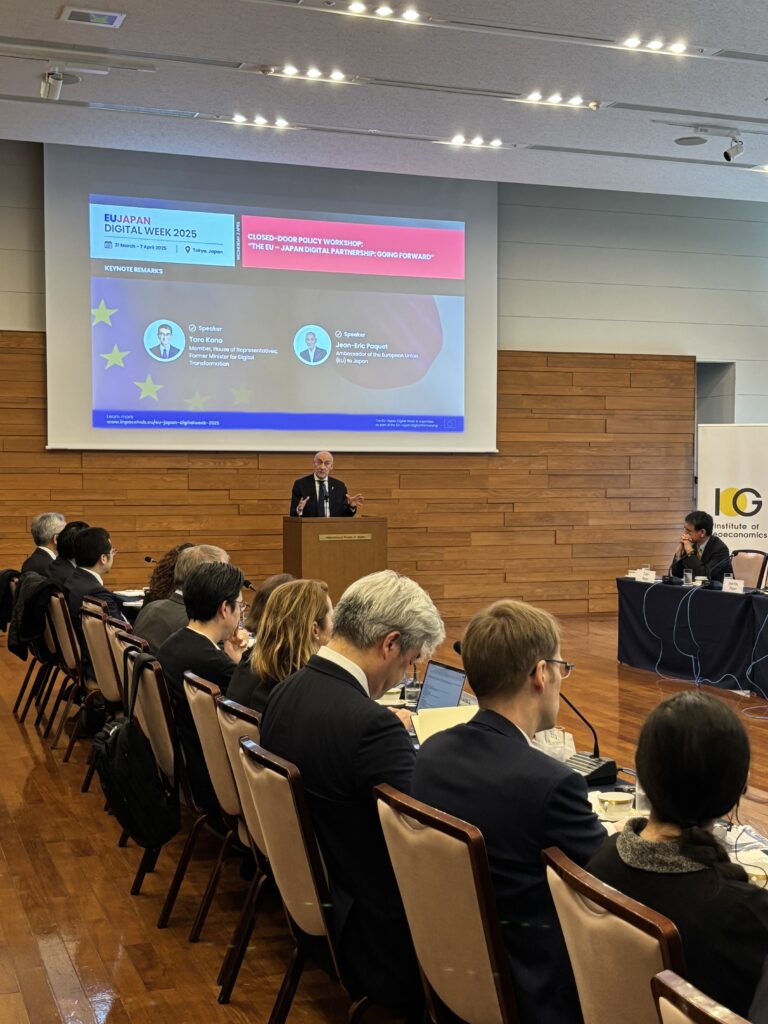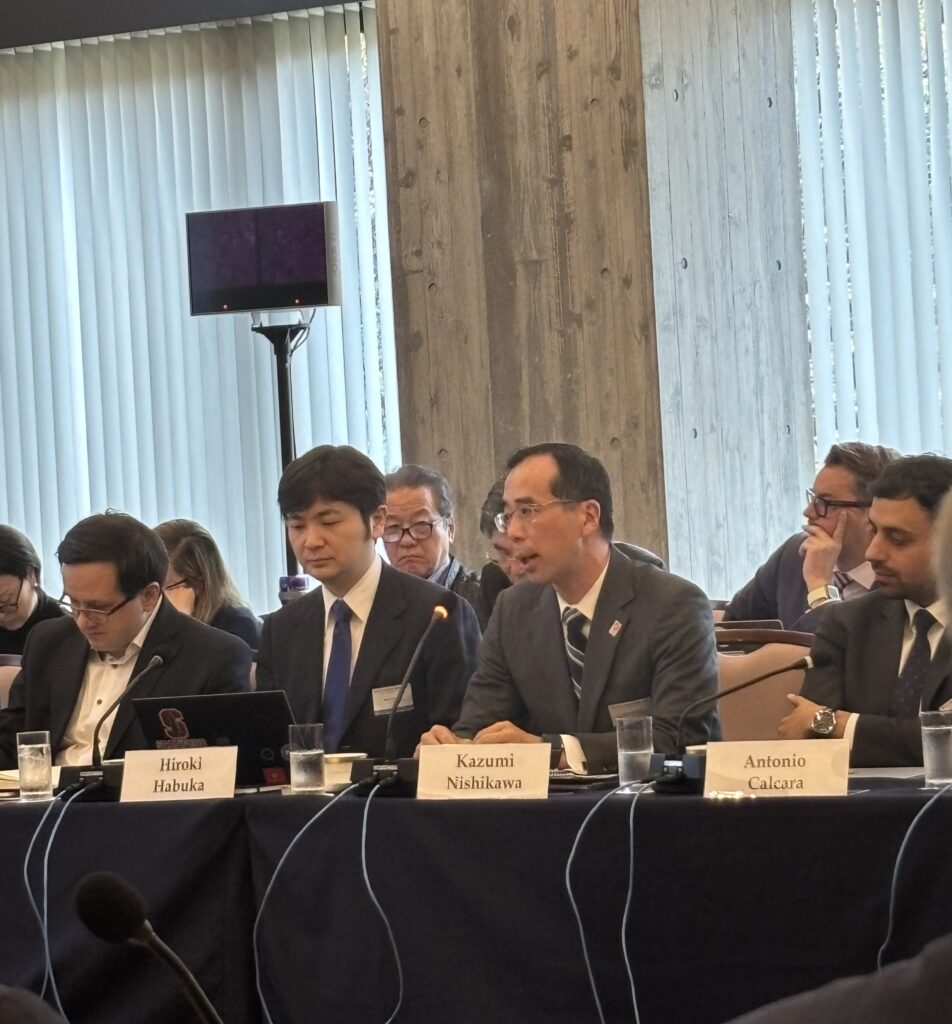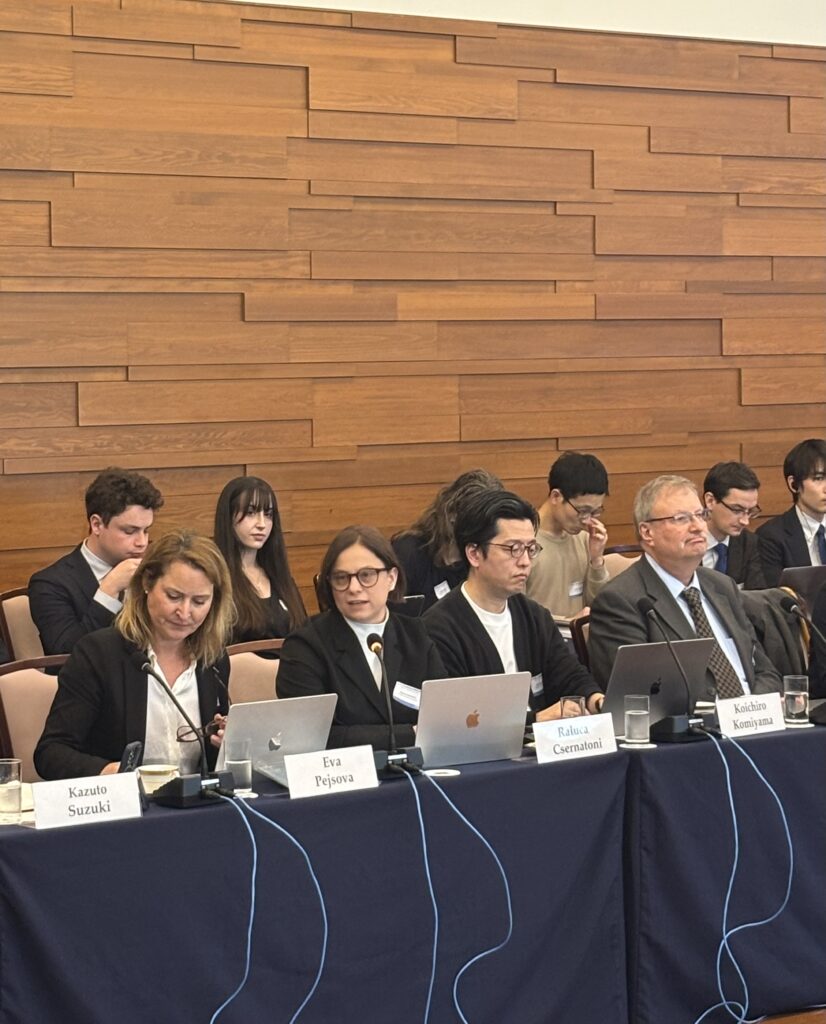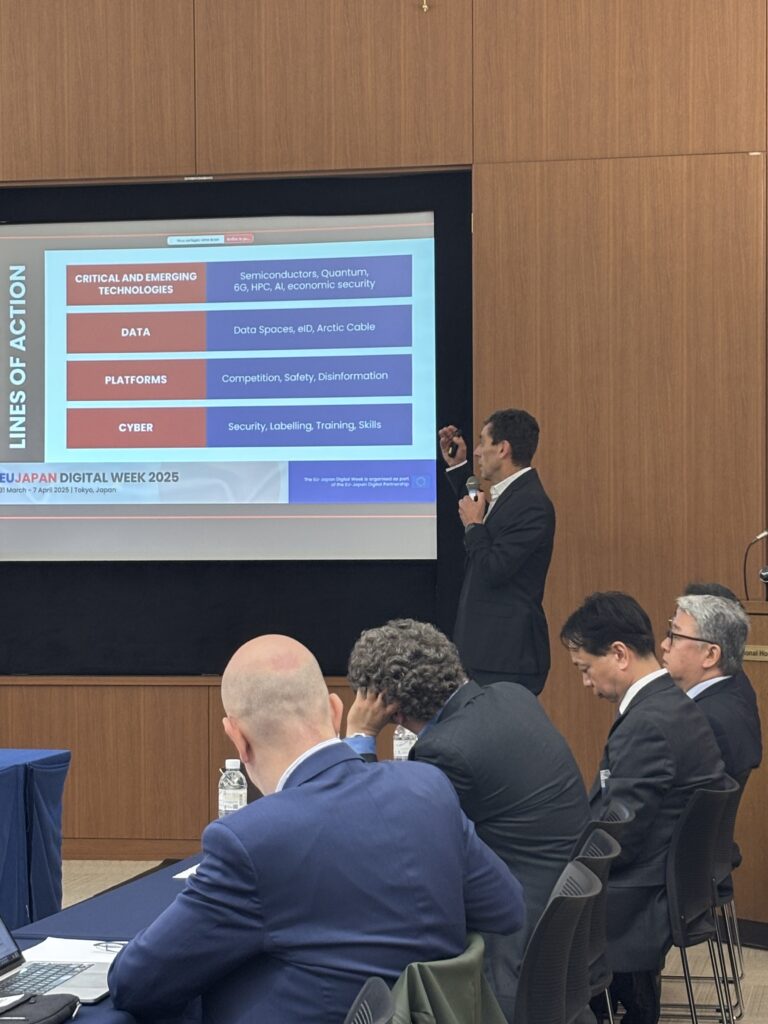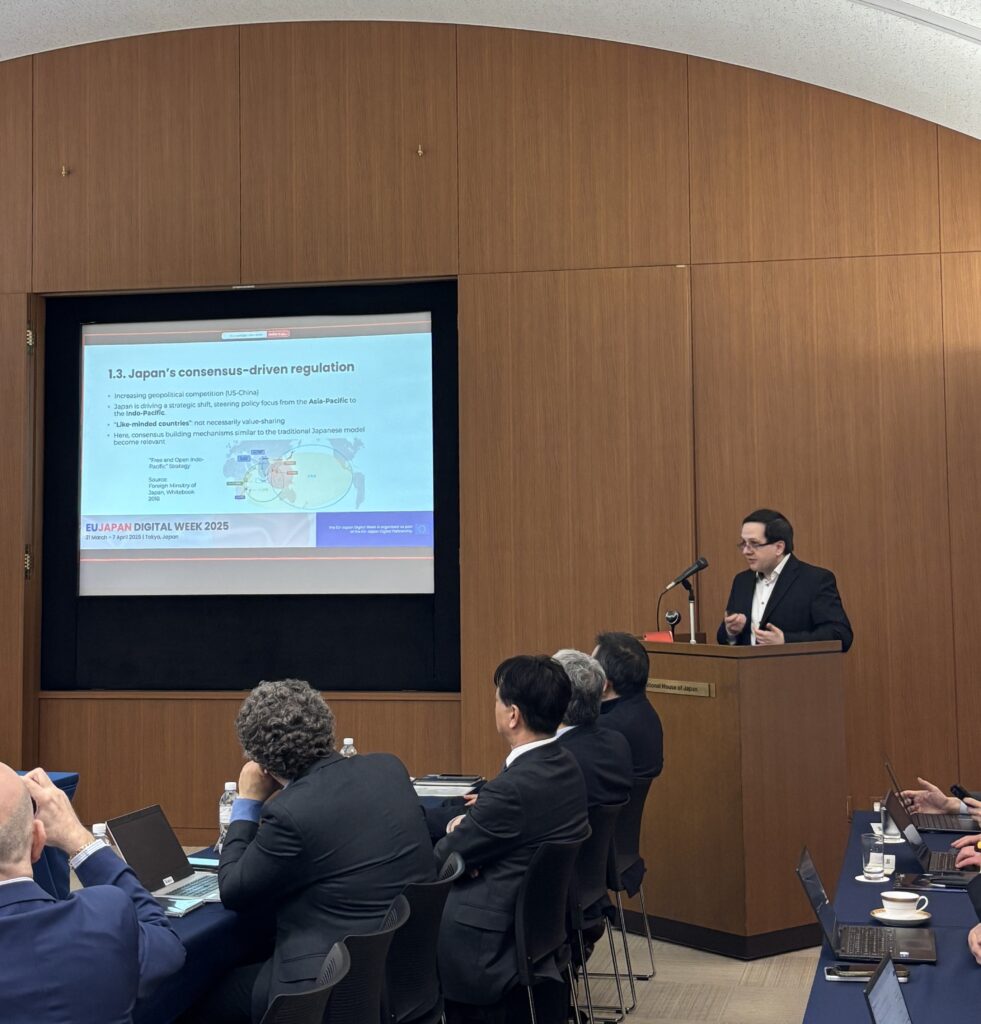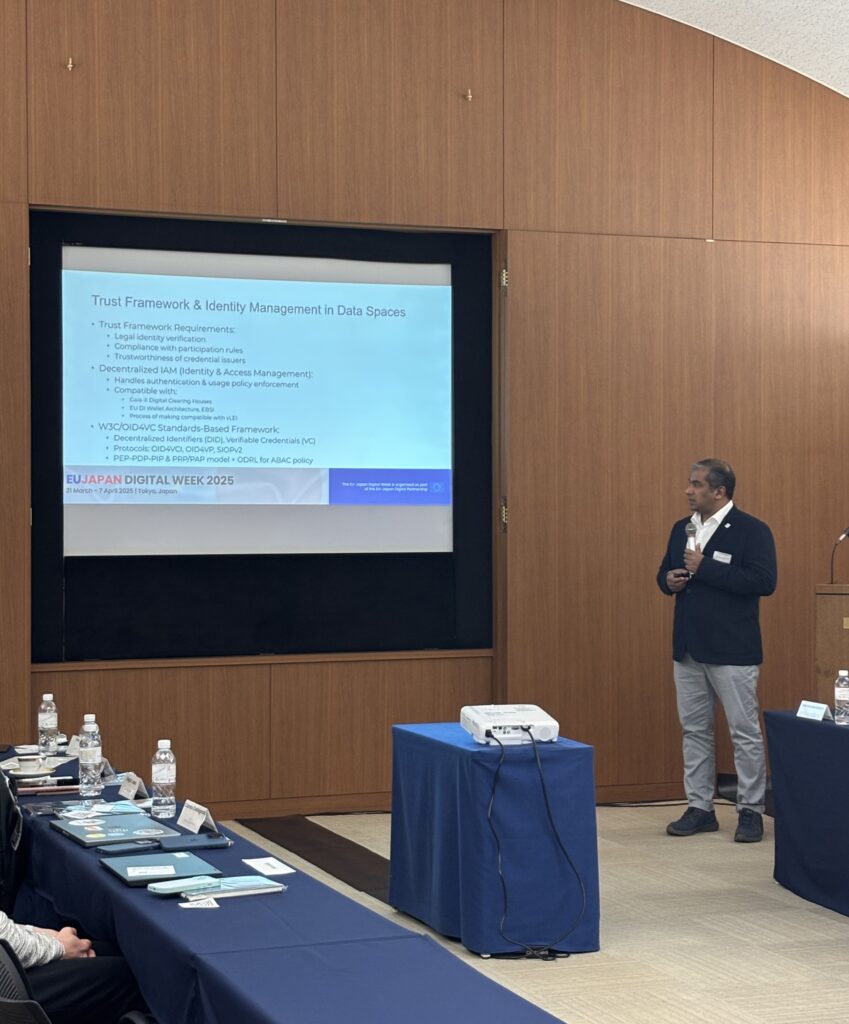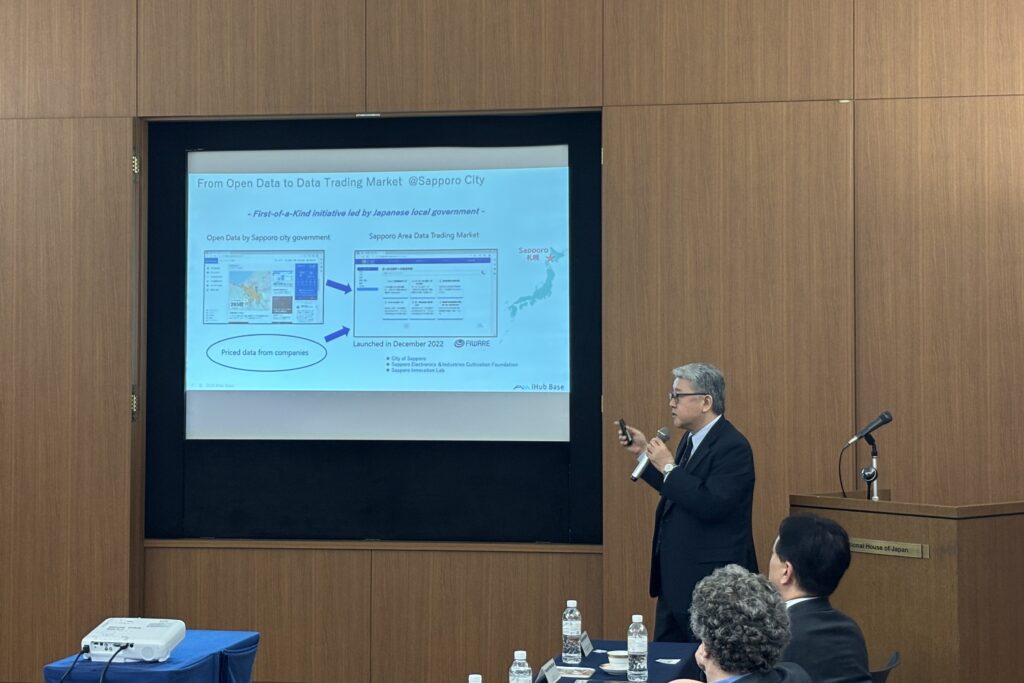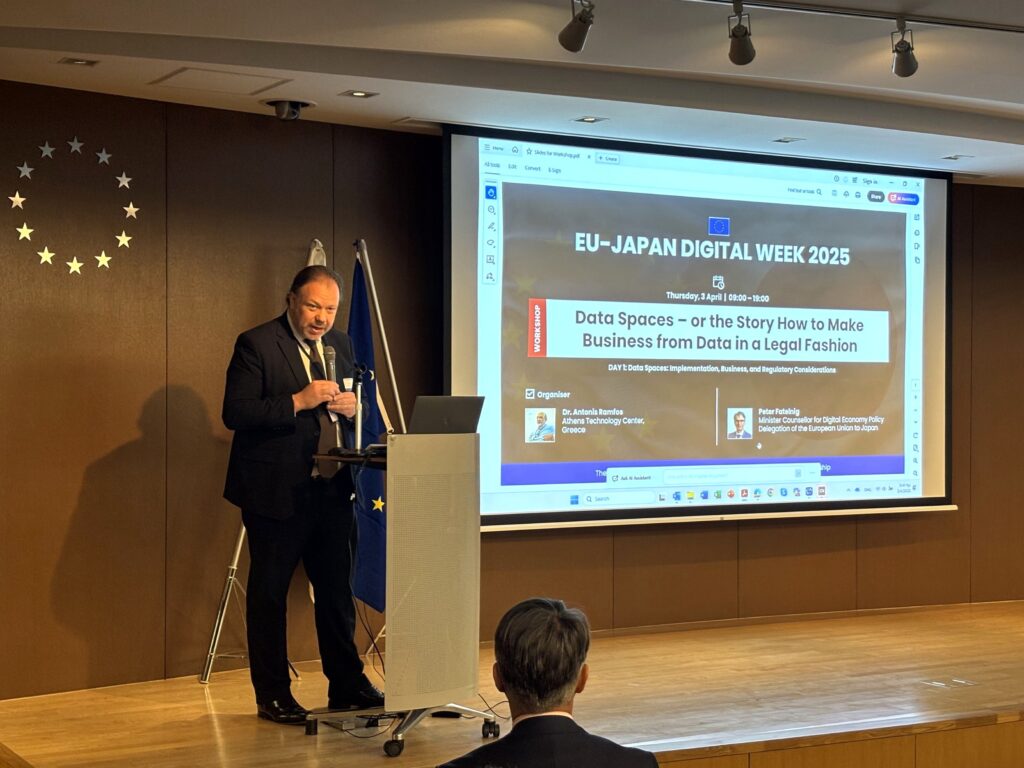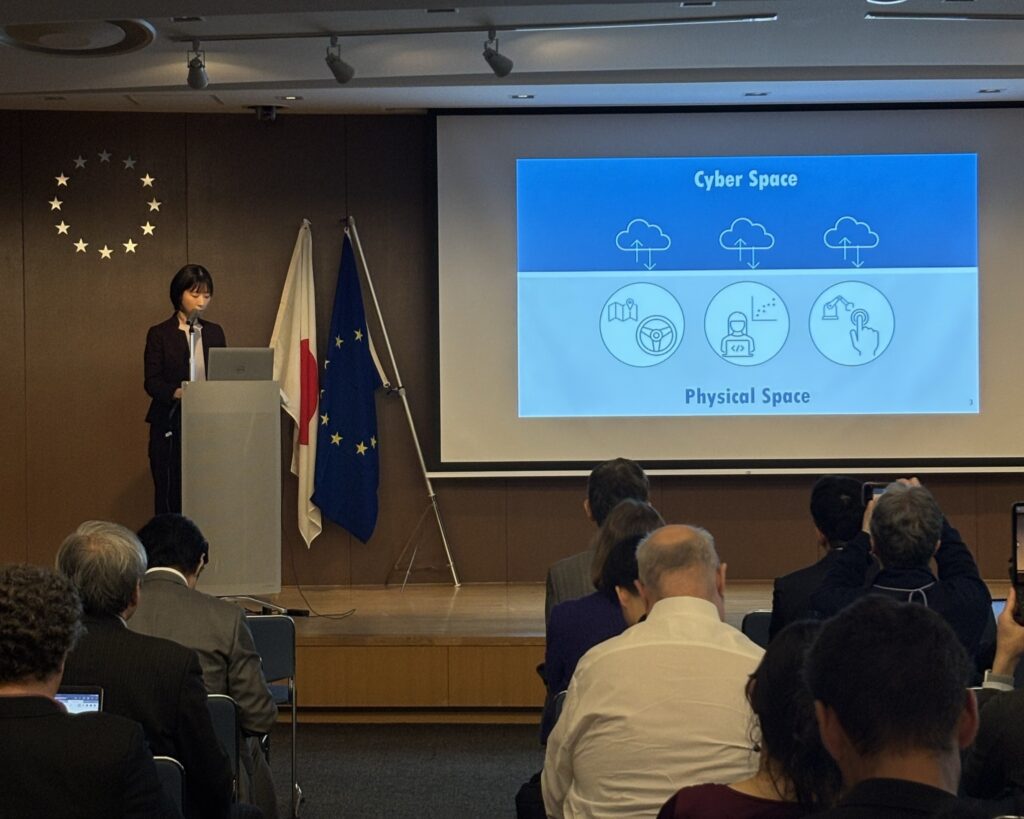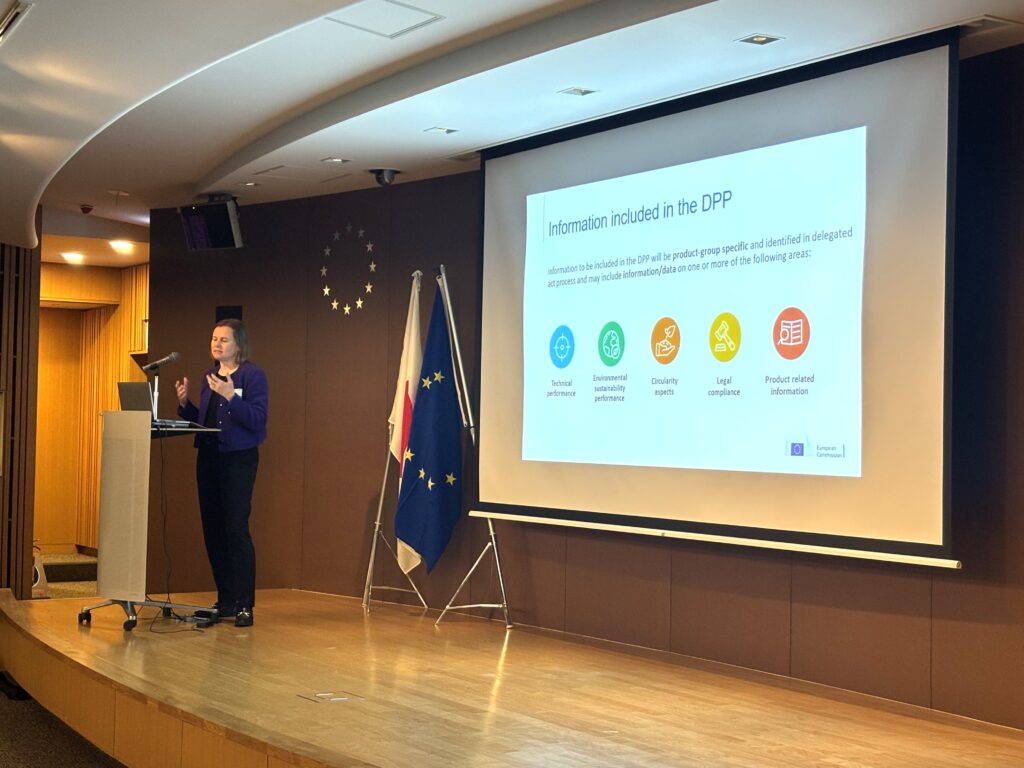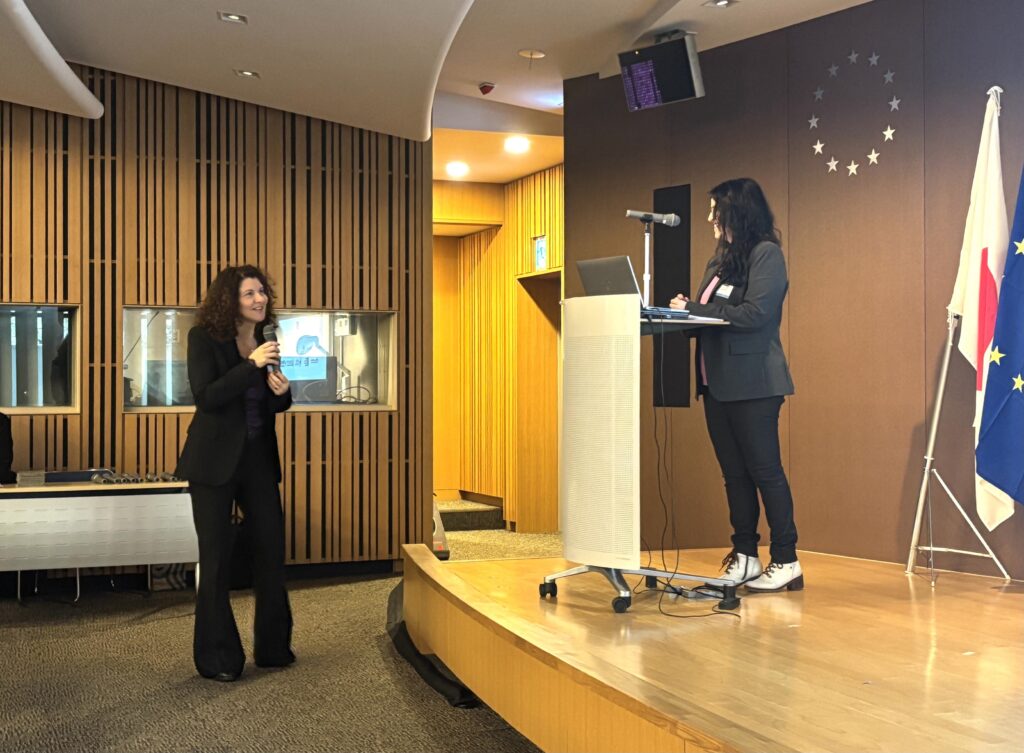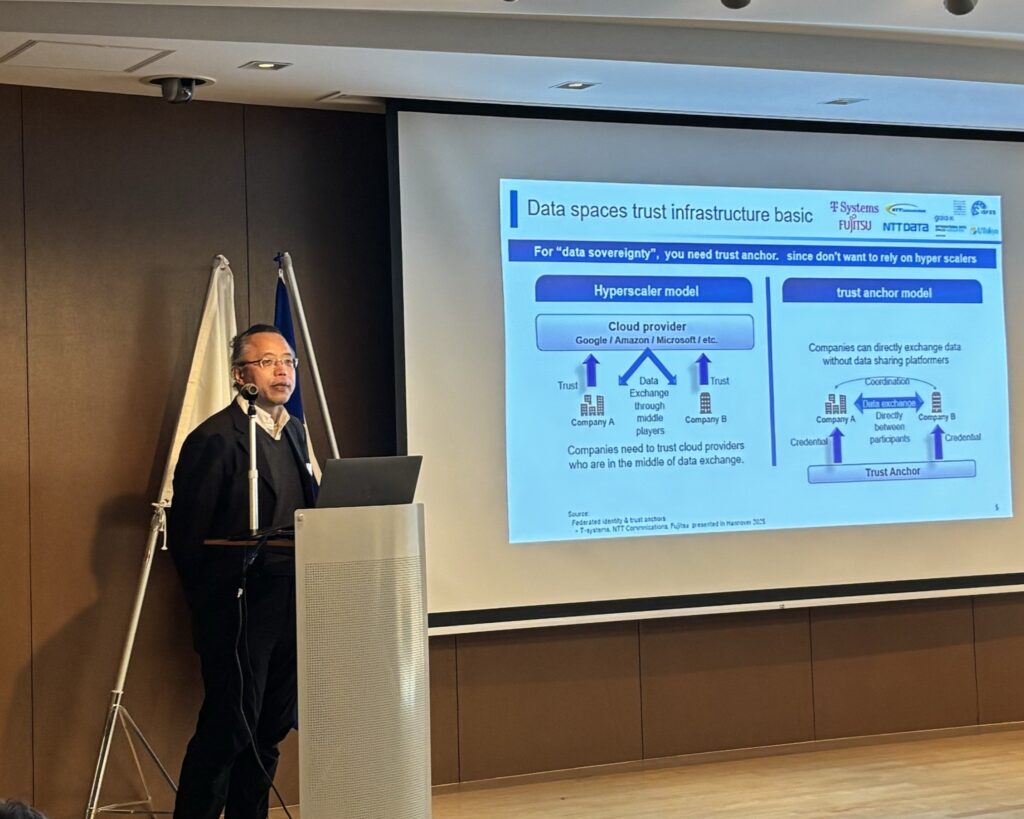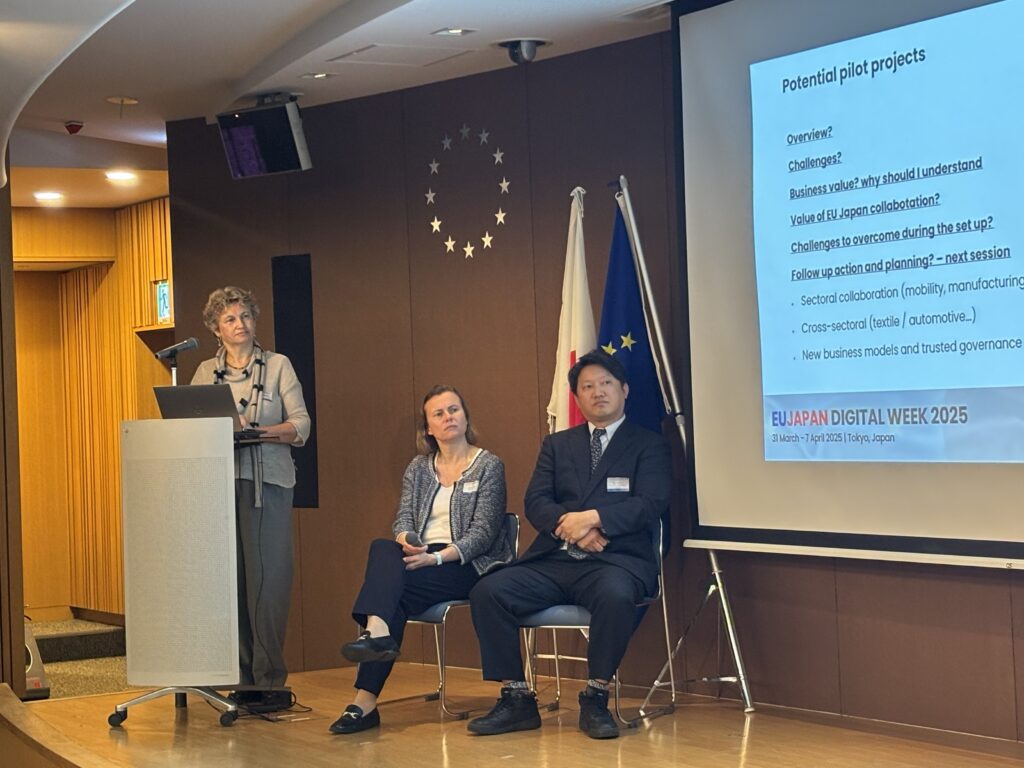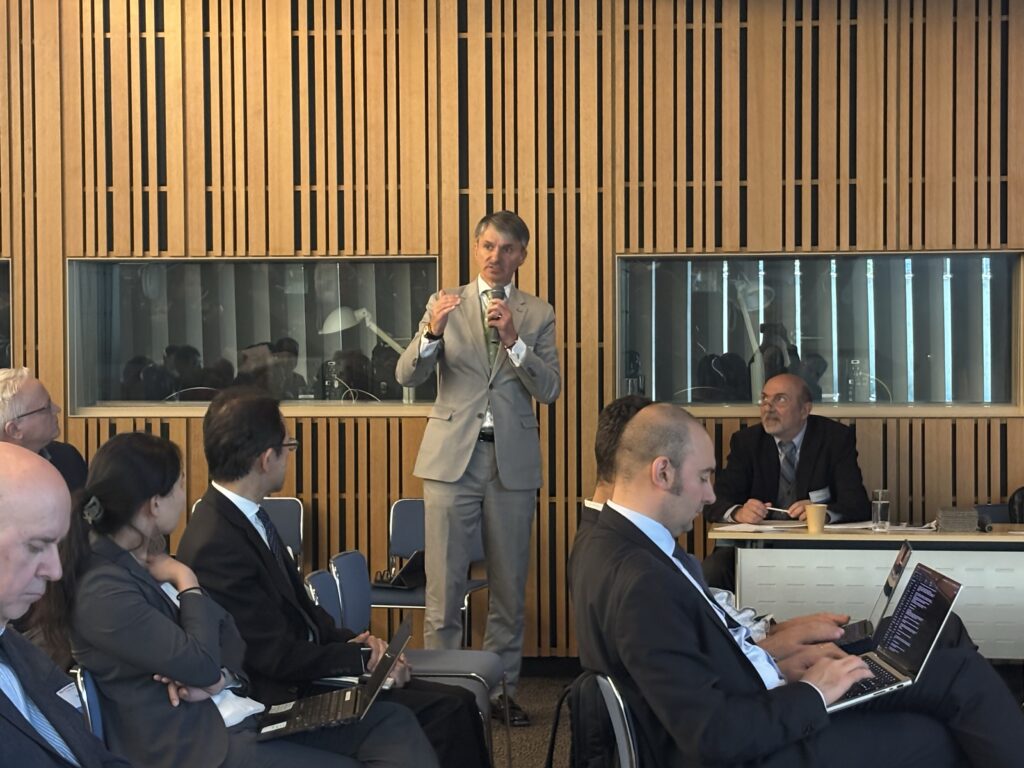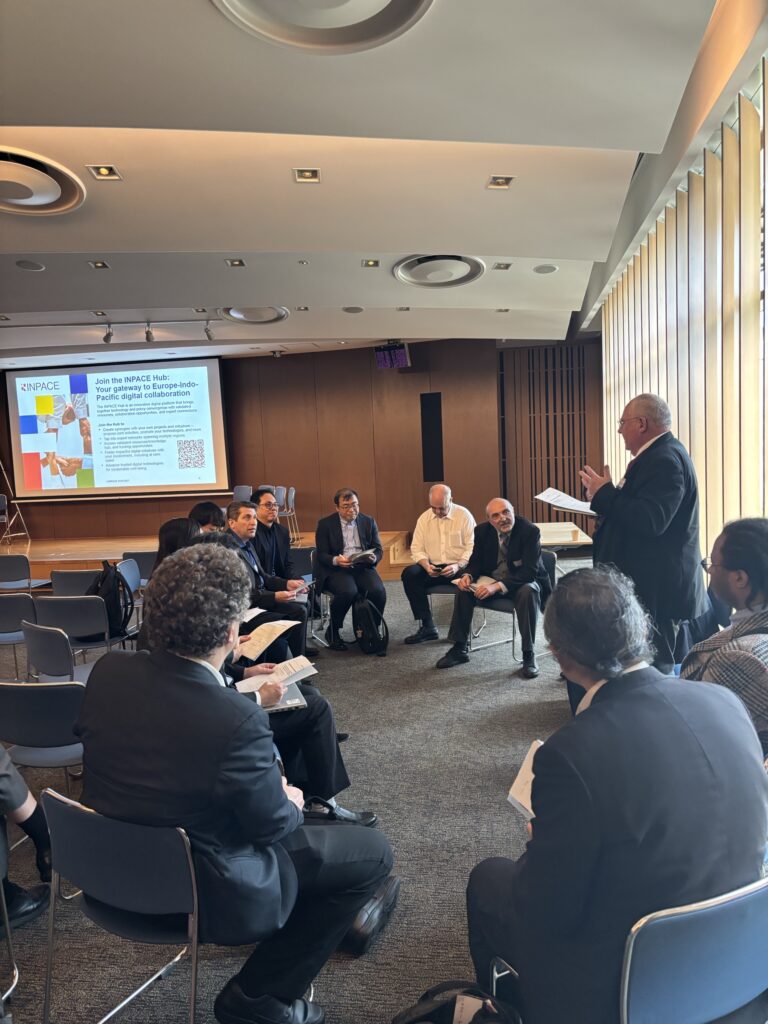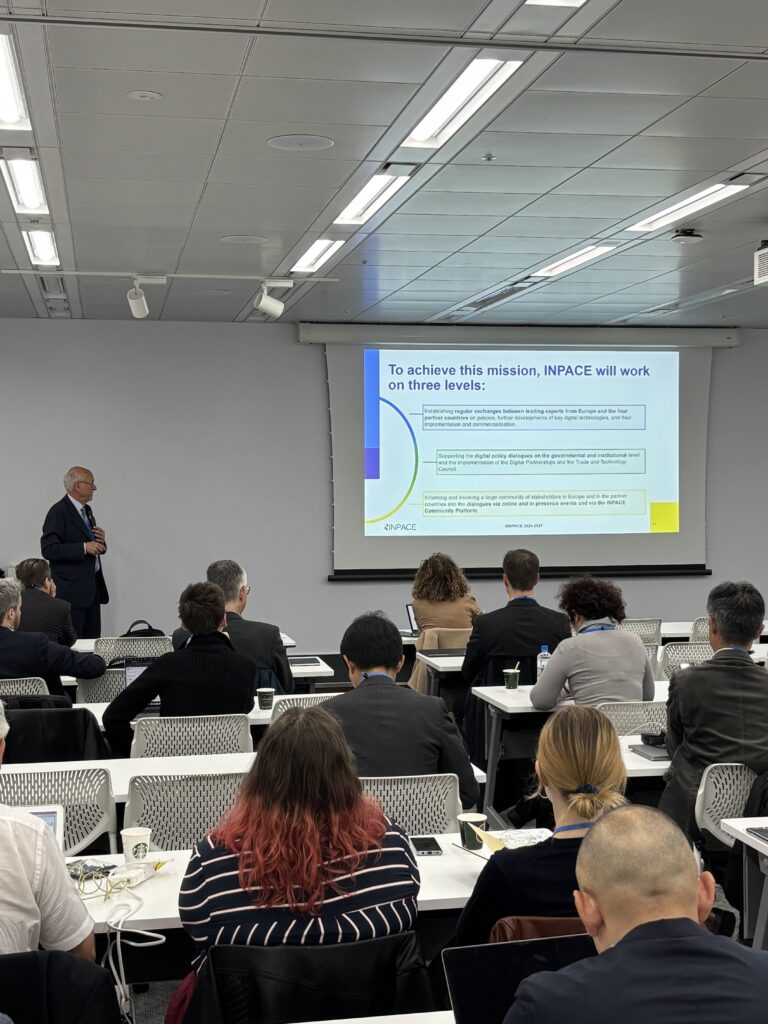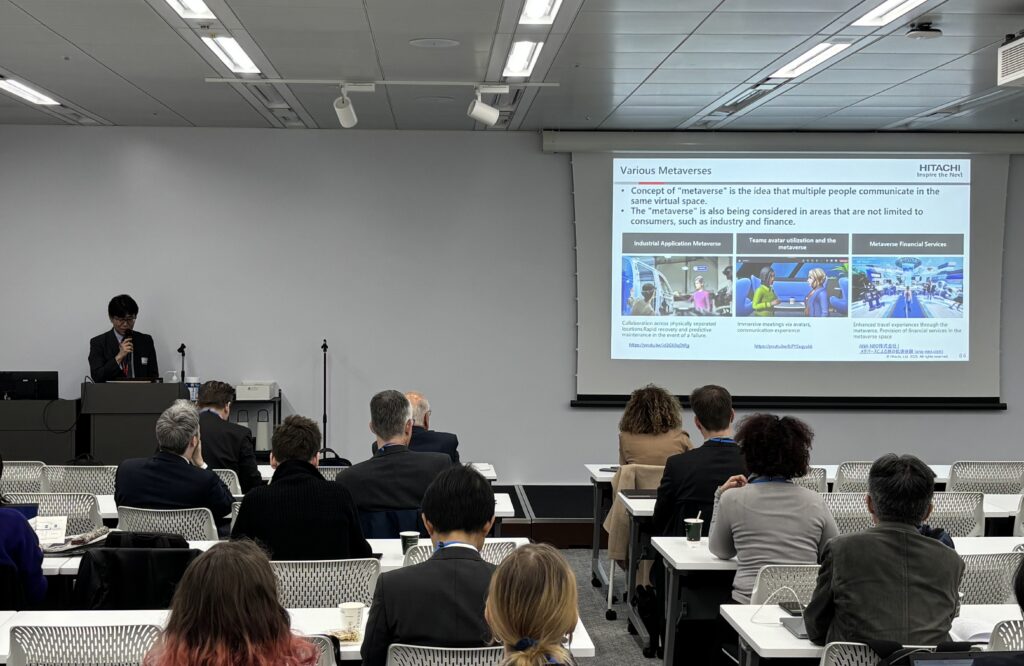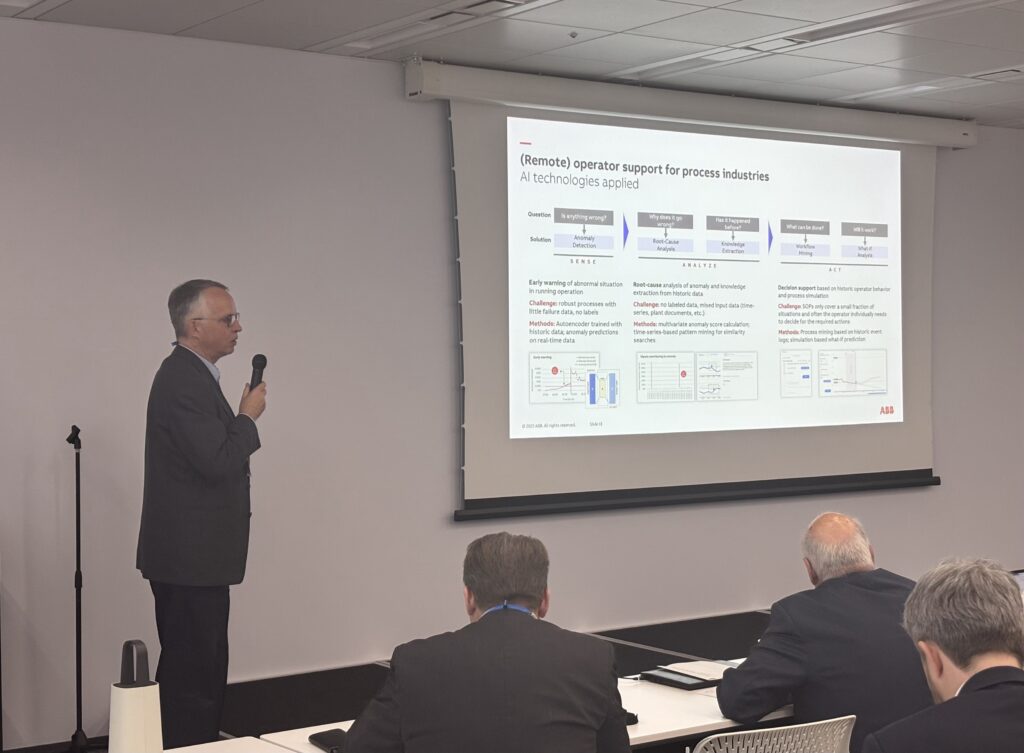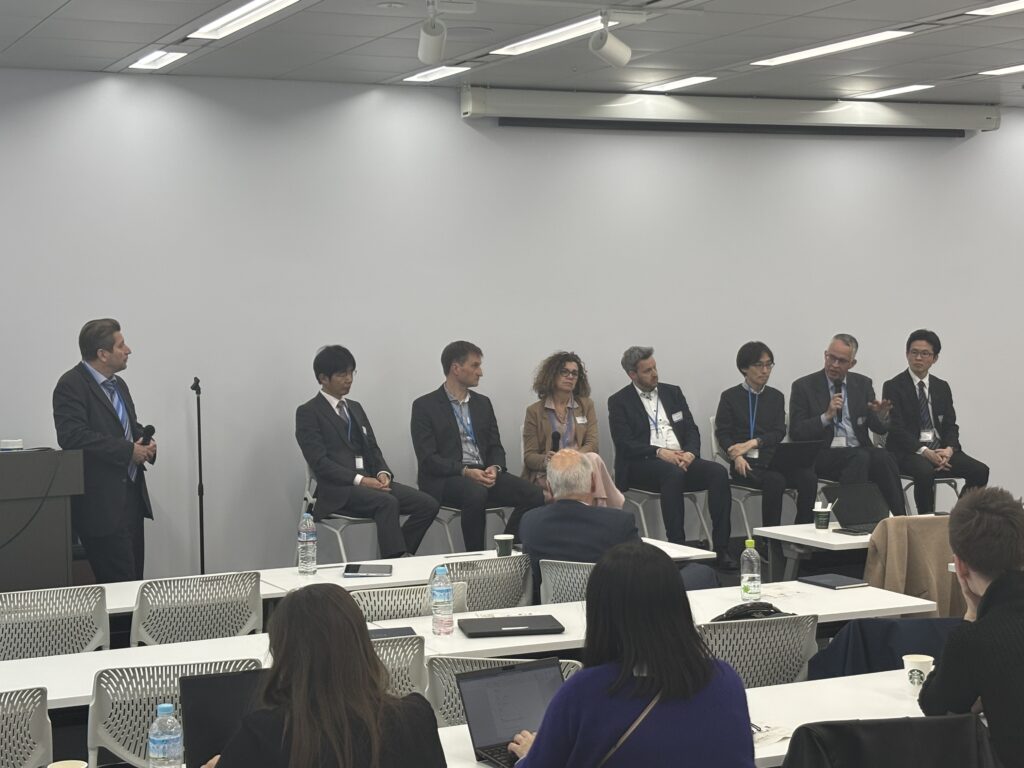The EU-Japan Digital Week, held from 31 March to 7 April 2025 in Tokyo, Japan, marked a significant milestone in strengthening digital collaboration between the European Union and Japan. Organised as part of the EU-Japan Digital Partnership, the event gathered 403 attendees, including policymakers, industry leaders, researchers, and experts, to address critical areas such as 6G, Data Spaces, Smart Connectivity and Computing, and Trustworthy Artificial Intelligence (AI).
Through a series of high-level workshops, panel discussions, and interactive sessions, the event provided a unique platform to lay the groundwork for future collaborations in the digital domain, with the shared goal of fostering a more connected, innovative, and secure digital future.
Download the full report and slides of the EU-Japan Digital Week
“Smart Connectivity and Computing” Workshop – 31 March
The “Smart Connectivity and Computing” Workshop, organised by Dr. Giacomo Inches (Martel Innovate) in collaboration with NexusForum.EU project and Prof. Kiyoshi Murata (Meiji University) aimed to bridge the gap between the European Union and Japan in the fields of cloud-edge computing and smart connectivity. The event successfully brought together industry leaders, researchers, policymakers, and stakeholders from both regions to foster dialogue and cooperation.
Session highlights
The workshop opened with a welcome address on the goals of the workshop and the impact of the Japan-EU Digital Partnership by the workshop organisers Dr. Giacomo Inches (Martel Innovate) and Prof. Kiyoshi Murata (Meiji University), followed by an introduction by Maria-Angeliki E. (RISE, NexusForum.EU Coordinator). A keynote address titled “The Future of EU-Japan Collaboration in Smart Connectivity” was delivered by Dr. Andrew Adams (Deputy Director, Centre for Business Information Ethics (CBIE), Meiji University) and set the tone for the day’s discussions.
The first session delved into innovations in Japan’s cloud-edge landscape and explored the latest developments and best practices in industries and academia. Presentations highlighted the growing role of open-source technologies in driving innovation and shaping the Japanese cloud-edge ecosystem.
Session 2 was an expert panel discussion focused on advancing cloud-edge computing through cross-cutting innovations. Panelists explored cross-cutting research topics and innovations that transcend specific industries, emphasising open-source initiatives and collaborative efforts.
Session 3 introduced the Research & Innovation Roadmap, developed by NexusForum.EU for the European Commission. The Roadmap provides strategic guidance for Europe’s Cognitive Computing Continuum, offering strategic direction to support the EU Cloud-Edge industry with essential R&D investments while promoting technological sovereignty. The session gathered feedback and input and engaged interested participants for future Working Groups and pilot projects dedicated to EU-Japan cooperation.
Session 4, “The EU-Japan Nexus”, highlighted the existing policies, initiatives, and funding mechanisms that support and foster collaborations between the EU and Japan. Through a dynamic panel discussion, participants explored opportunities to enhance cooperation in cloud-edge computing and smart connectivity.
The workshop successfully identified new opportunities for collaboration in Cloud Edge IoT between EU industries, researchers, policymakers, and Japanese partners, paving the way for tangible pilot projects and research initiatives. It also validated and refined the NexusForum.EU Roadmap with valuable insights from Japanese stakeholders.
“6G Horizons: Synergies for a Connected Future” Workshop – 1 April
The “6G Horizons: Synergies for a Connected Future” Workshop, organised by Adam Kapovits (Eurescom) and Prof. Akihiro Nakao (ASPIRE) aimed to strengthen collaboration and partnership between the EU, Japan, and other Indo-Pacific countries in advancing 6G development.
Session highlights
The workshop opened with an address by Masayuki Matsui (Ministry of Internal Affairs and Communications), who introduced the Beyond 5G Promotion Strategy 2.0 for AI Society in the 2030s, setting the stage for a day of insightful discussions.
Participants then heard an insightful keynote from Dr. Colin Willcock (6G Smart Networks and Services Industry Association), who shared perspectives on the Voice of European Industry and Research for Next Generation Networks and Services. Erzsébet Fitori (Smart Networks and Services Joint Undertaking (SNS JU) Office), delivered an engaging message introducing the Smart Networks and Services JU. She highlighted the European research path to 6G and emphasised the key collaboration between the EU and Japan on 6G technologies. Prof. Akihiro Nakao provided valuable perspectives on the Inclusive Creation of Next-Generation Cyber Infrastructure and AI-Native 6G Mobile Systems, diving into the XG Mobile Promotion Forum (XGMF) and highlighting the ASPIRE and HARMONY projects.
A dedicated session then showcased updates and presentations from European Smart Networks and Services Joint Undertaking initiatives, featuring the projects 6G MIRAI, SUSTAIN 6G, 6G-NTN, and 6G4Society. The workshop then highlighted Japanese collaborations with Europe and other countries, exploring key takeaways from international partnerships.The final session focused on industry insights, challenges, and opportunities for deeper cooperation in 6G development.
The event concluded with closing remarks from the organisers, reinforcing the importance of global collaboration in shaping the future of 6G.
At its core, the workshop sought to explore whether we are correctly perceiving and assessing, and subsequently addressing and responding to the major trends, social and business needs from a broad set of industries in 6G research and development, especially in light of disruptive forces such as generative AI.
Closed-Door Policy Workshop: “The EU – Japan Digital Partnership: Going Forward” – 2 April
The Closed-Door Policy Workshop: “The EU – Japan Digital Partnership: Going Forward”, brought together high-level representatives from the European Union and Japan, including policymakers, academia, think tank experts, and industry leaders. Co-organised by Dr. Eva Pejsova (Centre for Security, Diplomacy and Strategy) and Dr. Kazuto Suzuki (Institute of Geoeconomics), the workshop aimed to foster meaningful dialogue and generate actionable insights to advance digital cooperation and innovation.
Session highlights
The event opened with welcoming remarks from the organisers, setting the stage for a series of strategic discussions. This was followed by keynote remarks from Taro Kono, Member of House of Representatives and Former Minister for Digital Transformation, and Jean-Eric Paquet, Ambassador of the European Union (EU) to Japan.
Panel I – Towards policy alignment in emerging and new technologies, addressed the need for policy coordination in artificial intelligence (AI), quantum technologies, and advanced semiconductors.
Panel II – From space to under the sea: critical digital infrastructure for sustainable global connectivity explored the role of secure digital infrastructure in promoting sustainable connectivity on a global scale.
The workshop culminated in a set of policy recommendations aimed at removing political, regulatory, and technological barriers, reinforcing multistakeholder engagement between the two partners, and promoting responsible, human-centred global governance of digital emerging and disruptive technologies (EDTs).
“Trusted Data Exchanges: From Standards to Pilots in a Changing World” Workshop – 2 April
The “Trusted Data Exchanges: From Standards to Pilots in a Changing World” Workshop aimed to explore practical implementation of trusted data exchanges, supporting the Memorandum of Cooperation on digital identities and trust services signed between the EU and Japan.
Session highlights
Organised by Dr. Franck Le Gall (EGM), the event opened with welcoming words from the organiser himself, followed by keynote remarks. The keynotes focused on consensus-driven data regulations in Japan, which relies on soft regulation to balance privacy concerns with commercial and public interests in the usage of data. Discussions also touched on Japan’s policy to develop a data integration platform as a public asset, setting the stage for an open exchange of ideas on data governance.
The “Requirements and standards for data trusted exchanges” session highlighted the recent ETSI Technical Committee on Data solution, gathering ETSI forces, to support the deployment and operation of distributed solutions for data collection, integration, sharing and management. It also introduced the role of NGSI-LD in enabling flexible and interoperable data exchanges across domains, particularly in handling provenance information.
Additionally, the session explored the contribution of Verifiable Legal Identifiers to trusted data exchanges. The discussion concluded with an interactive segment identifying key data exchange points for cross-border technical interconnection demonstrations.
The last session, “Moving to Action,” showcased FIWARE’s efforts in promoting open standards for trusted data exchange platforms, alongside presentations on reference implementation initiatives. A particular focus was given to iHub Base, which supports training programs and workshops for entrepreneurs and engineers developing connected services. The session ended with a brainstorming discussion, identifying cooperation directions to support establishment of cross-border trusted data exchanges pilots. The organiser Franck Le Gall wrapped up a day of strategic discussions with closing remarks.
The workshop served as a platform to address the practical challenges and barriers in the adoption of standards for trusted data exchanges. It laid the foundation for future collaboration between Europe and Japan in the development and deployment of pilot projects related to data spaces and semantic interoperability. Moreover, participants gained insights from current pilots in both regions, drawing key lessons learned and policy recommendations on aligning efforts in digital identity frameworks, semantic interoperability, and data governance.
“Data Spaces – or the Story How to Make Business from Data in a Legal Fashion” Workshop 3/4 April
The “Data Spaces – or the Story How to Make Business from Data in a Legal Fashion” Workshop introduced participants to the concept of data spaces, their architecture, stakeholders, and role in driving digital transformation. With a strong focus on interoperability challenges, the workshop explored business models for data spaces, best practices, and successful case studies. Organised by Dr. Antonis Ramfos (Athens Technology Center) and hosted at the Delegation of the European Union to Japan, the event provided valuable insights into data spaces.
Special recognition is extended to Peter Fatelnig, Minister Counsellor for Digital Economy Policy at the Delegation of the European Union to Japan, for his efforts in bringing this workshop to life.
DAY 1: Data Spaces: Implementation, Business, and Regulatory Considerations
The workshop commenced with opening remarks by the organiser Dr. Antonis Ramfos, Thomas Gnocchi (Minister / Deputy Head of the European Union Delegation to Japan), and Makoto Kuroyabu (Chief Director for International Strategy, Digital Agency), setting the stage for a deep dive into the role of data spaces. A keynote speech followed, addressing the role of data spaces in the digital and circular economy, with a particular emphasis on developments in the EU and Japan.
The first session focused on the implementation of data spaces, highlighting the role of the Data Spaces Support Centre in the EU and Data Spaces in Japan. Discussions covered strategies for building ecosystems, ensuring interoperability among data spaces, and leveraging OSS (Open Source Software) reference implementations.
The second session delved into the value creation of data spaces, providing an overview of real market opportunities for data spaces and key sectors expected to drive collaboration, including textile, batteries, automotive and telco.
The third session, “Regulatory Landscape for Data Free Flow with Trust,” examined the EU Commission’s DPP Legal Framework and the EU Data Strategy, with a focus on the Data Act. Additionally, the session highlighted the ETSI standardisation efforts aimed at fostering data flow with trust.
DAY 2: Towards Interoperable Data Spaces – Practical Considerations
The second day of the Data Spaces workshop, focused on practical considerations of interoperable data spaces, kicked off with opening remarks from the workshop organiser Antonis Ramfos, followed by a session titled “Textile Data Spaces,” led by Alessandro Canepa (Fratelli Piacenza S.p.A.). The session provided an overview of Piacenza Group as a European Community of Practice for a Sustainable Textile Ecosystem and offered insights on the EU initiative SM4RTENANCE, highlighting its collaboration forms and data value chain.
The following session delved into the challenges and experiences of interoperable data spaces, addressing the challenges and solutions of data spaces interoperability and the challenges of cybersecurity in data spaces. Moreover, the session provided key insights on the open standards and open source in enabling data space interoperation. The session also explored the experience from implementing an EU-Japan cross-data space case study, providing insights into data collaboration.
A dynamic panel discussion followed, focusing on opportunities for joint data spaces and strategies to incentivise data sharing among companies and stakeholders within complex value chains.Key questions guided the discussions:
- How can we incentivise companies to share data in complex, competitive value chains?
- What sector-specific pain points could we solve through a pilot project?
- What makes data-sharing initiatives attractive to companies, especially SMEs?
- Where do EU and Japan have natural synergies / alignment for data collaboration?
- If we launched a small pilot tomorrow, what would it look like? What is the success metric?
Participants then engaged in an interactive workshop dedicated to designing joint EU-Japan data space pilot projects. This workshop featured group activities and case study analyses, with three groups exploring practical steps for future cooperation. The session concluded with an open discussion of each group’s key insights.
The day concluded with a forward-looking session on future trends and innovations in data spaces, exploring research priorities in the EU and Japan.
Antonis Ramfos and Peter Fatelnig delivered closing remarks at the workshop, which represented a significant milestone in EU-Japan collaboration on data spaces.
Over the two-day event, participants gained hands-on insights through demonstrations of implemented data spaces and practical guidance on establishing joint data spaces within organisations. The workshop successfully fostered cross-border collaboration and networking, strengthening partnerships among key data space stakeholders.
“Critical Applications of AI in Industry, Healthcare and Other Sectors” Workshop – 7 April
The “Critical Applications of AI in Industry, Healthcare and Other Sectors” Workshop brought together leading experts to discuss the challenges and best practices in developing AI applications where reliable and highly accurate functioning is critical due to the potential for severe consequences in case of failure. Organised by Prof. Sebastian Engell (TU Dortmund and ENRICH Global), Prof. Iiro Harjunkoski (Aalto University and Hitachi Energy Europe), and Nobuo Nukaga (Hitachi Research and Development), the event focused on AI systems deployed in transportation, industrial production, and digital healthcare – sectors where system failures can result in serious safety risks, patient harm, or substantial financial losses.
Session highlights
The day started with an introduction by Prof. Sebastian Engell, who highlighted the significance of the Japan-EU Digital Partnership and introduced the INPACE initiative. Welcome addresses from Mirai Odagiri (Japan AI Safety Institute – AISI) followed, setting the stage for an in-depth exploration of critical AI applications.
Session 1, titled “Transportation Systems and Health Care”, showcased how Hitachi is leveraging AI in its Social Innovation Business and explored the safety assurance of a driverless regional train. Presentations also explored search-based approaches to enhancing the safety of autonomous driving systems. The session concluded by addressing key challenges for AI applications in intensive care medicine.
Session 2 focused on the role of AI in industrial automation, covering AI and machine learning-enabled digital transformation in Japan’s process industries. Participants learnt about critical applications of AI in the metals and steel industry, and explored OT (Operational Technology) x AI safety approaches at Hitachi. The session also discussed the use of AI for the automation of industrial processes, with a key focus on ABB Process Safety.
The workshop concluded with an engaging panel discussion focused on the methods and regulations needed for the development of critical AI applications and opportunities for EU-Japan collaboration. Closing remarks followed from the workshop organiser Prof. Sebastian Engell.
This high-level exchange provided a comprehensive overview of the state-of-the-art in critical AI solutions, highlighted ongoing issues, and discussed the information of the EU’s AI Act. It served as a catalyst for new collaborations between Europe and Japan, offering valuable input for future funding programs in both regions.
Driving innovation through global cooperation
The EU-Japan Digital Week 2025 successfully reinforced the growing partnership between Europe and Japan in the digital sphere. By bringing together key stakeholders, the event fostered meaningful discussions, knowledge exchange, and concrete collaboration opportunities across areas such as 6G development, data spaces, AI applications, and cloud-edge computing.
Many thanks to all organisers, speakers, and participants who contributed to a week of insightful discussions!
A special thank you to Peter Fatelnig, Minister Counsellor for Digital Economy Policy at Delegation of the European Union to Japan, and to all organisations and projects who made this event possible:


